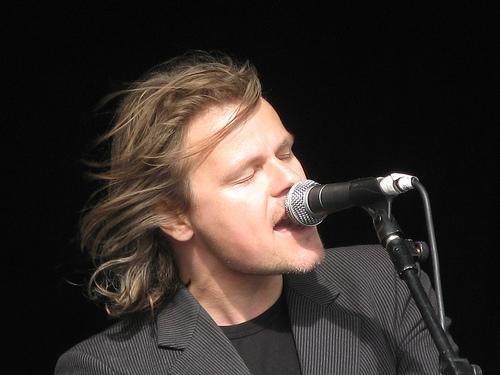In life Tom McRae is a cockeyed optimist. When his label, V2, dumped him, his response was to start up his own recording studio and to enthusiastically play every honky-tonk between LA and New York. It was the fans that kept McRae positive. An almost fanatically loyal crowd, they stuck with him through thick and thin and asked for little. Their demand was singular and a little perverse. All they wanted was to leave each concert feeling a little bit more depressed than when they went in.
For, in music, McRae is a miserablist, out and proud. The Sixties had Leonard Cohen. The Eighties had the Smiths. McRae would be the man to bring introspection to the Noughties. Which was fine when he was nominated for the Mercury prize in 2003. But, unfortunately for him, in the middle of a recession the world seems to want to escape into lavish camp, like Lady Gaga.
McRae’s latest album, The Alphabet of Hurricanes, is, however, his least downbeat to date. The guitar, voice and cello combination has been augmented with ukuleles and clarinets. And tortured torch songs like “You Cut her Hair”, once described as “dark as the inside of a cello”, have moved way for alternative country numbers like "Fifteen Miles Downriver" The new album is awash with Americana, imbibed from McRae’s Hotel Café tours with Joe Purdy, Steve Reynolds and Cary Brothers. And this new musical vocabulary takes the edge of his torment and gives him more space to explore his central theme; the fragile bonds between people.
Last night, however, McRae had angst in his pants. Exactly what the fans came for. The trademark tenor cry. The heart on the sleeve. From hotel cafes to theatres there is always something incredibly intimate and personal about McRae concerts. It’s not just that everyone knows all the words or that they laugh indulgently at his appalling jokes (he parades terrible one-liners about McRadios that only play bad news and Mcrayons that only come in black). It’s more that you sense that most of the people there have fallen in love, or perhaps ,more likely, split up to his music. They draw comfort vicariously, knowing that McRae has had it worse or felt it more deeply. Which is mystifying as McRae fans look like such nice people. They don’t look like they read Camus, have particularly troubling love lives, or need a poet of despair. And yet McRae resonates with their insecurities, battles and betrayals.
It seems baffling why exactly McRae’s music is almost solely enjoyed amongst such a select groupThe set mixed old with new, and ushered in a change of sound. The voice was more varied in pitch and with the largest band McRae has toured to date, the emphasis has shifted from folk to rock. Brian Wright, also the support act, gave a magisterial performance romping through country licks and rock runs on a variety of guitars and banjos. The rhythm section - Dave Walsh and Richard Hammond - brought weight, and long-time collaborators Olli Cunningham, keyboards, and Oli Kraus, cello, brought musical cohesion. Kraus’s unique use of effects-pedals also summoned up chilling spectral harmonics, swooning melodic lines, and in blues hoe-down “Me and a Stetson” sounded remarkably like a didgeridoo.
The ovations of the night belonged to the long-standing crowd-pleasers. "Karaoke Soul" was imbued with all the pathos of a drunken bust-up in a suburban town centre. "End of the World News" became one of many interactive songs with different sections of the audience singing different sections of the song. "Walking 2 Hawaii" was as ever as ghostly as the line between beauty and death it expresses. The evening ended with a rousing and anthemic, "Boy with the Bubblegun". But maybe it would have been better to have left off with the song that preceded - an unamplified and emotionally stripped-back version of "Bloodless", a song that members of the crowd had been screaming for, for half the evening.
McRae concerts feel exclusive, almost private. But it seems baffling why exactly McRae’s music is almost solely enjoyed amongst such a select group. Maybe that’s just the way they want it? McRaetheists guard Tom jealously, as if the whole party would be spoilt if anyone else gatecrashed. I am not exactly sure what they fear would happen – that he might suddenly start appearing on the Jonathan Ross show playing Jack Johnson covers ? – but really there is little danger that he will do anything other than he always has. Play superior, well-crafted folk rock. Made to be listened to in a bedsit. Alone.















Add comment